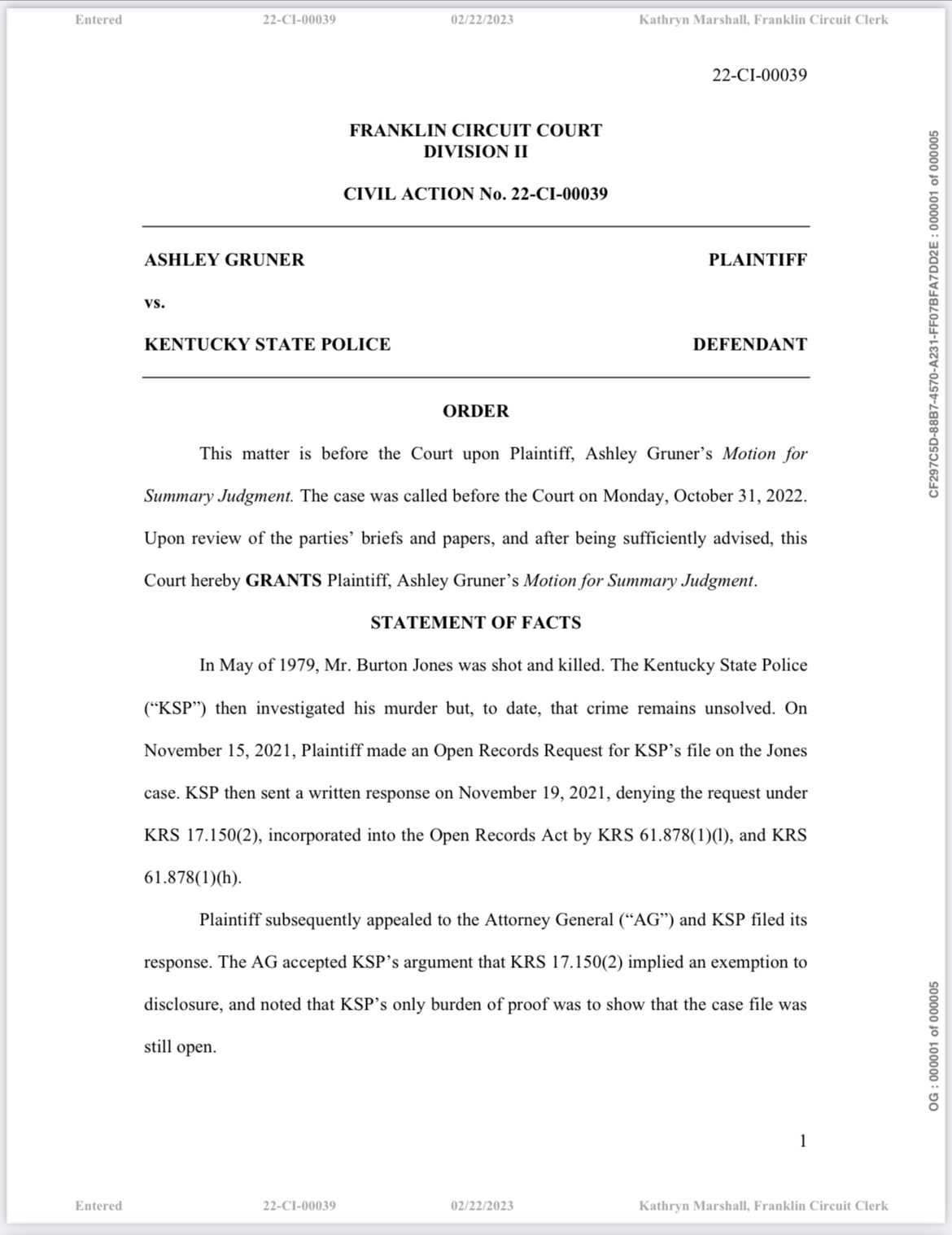
In a brief opinion issued on February 22, the Franklin Circuit Court ruled in favor of Ashley Gruner in her appeal from the Department of Kentucky State Police's denial of her November, 2021, open records request for the KSP file in the 1979 unsolved murder of Burton Jones.
The court rejected KSP’s argument that the 44 year old case file was exempt from public inspection under KRS 17.150(2) and KRS 61.878(1)(h).
https://apps.legislature.ky.gov/law/statutes/statute.aspx?id=51393
https://apps.legislature.ky.gov/law/statutes/statute.aspx?id=46877
The court affirmed -- without expressly citing -- a November 2022 Court of Appeals opinion, Courier Journal v Shively Police Department in which the appellate court rejected Shively’s reliance on KRS 61.878(1)(h), “the law enforcement exception,” because it presented no proof of actual harm to the upcoming prosecution from disclosure of the requested investigative records.
Significantly, the appellate court also recognized that:
"KRS 17.150(2) provides for the complete disclosure of intelligence and investigative reports maintained by criminal justice agencies after a prosecution is complete, subject to four specific exemptions. Therefore, KRS 17.150(2) should only apply if the conditions set out in its prefatory language are met. There is no reaching the exceptions where a determination to prosecute has been made and the prosecution is not yet completed.
“KRS 17.150(2) does not apply to justify the withholding of records at this juncture, it provides no justification for the SPD’s withholding of the records.”
https://kyopengov.org/blog/kentucky-court-appeals-opinion-rejects-law-e…
The Shively Police Department has filed a petition in the Supreme Court for discretionary review. In an unusual move — at least in the open records context — the Kentucky Attorney General on February 3 filed a motion for leave to file an amicus curiae brief in the case.
(An amicus curiae is, literally a “friend of the court" — someone who is not a party to a case, but offers information that bears on the case.)
Yesterday’s opinion in the Gruner case addresses the same issue: whether KRS 17.150(2) “essentially swallows up . . . the limitations contained in the KRS 61.878(1)(h) exemption.” In a few words, the Franklin Circuit Court affirms the emphatic holding in Shively Police Department v Courier Journal that it does not.
Judge Thomas Wingate begins the opinion with this observation about the Kentucky General’s open records decision affirming KSP’s denial of Gruner’s request:
“The Circuit Court does not review and is not in any sense bound by the Attorney General’s decision, nor is it limited to the ‘record’ offered to the Attorney General. (The circuit court is to ‘determine the matter de novo.’) The agency, rather, bears the burden of proof, and what it must prove is that any decision to withhold responsive records was justified under the Act.
A police department’s investigatory file is not categorically exempt from disclosure under the Open Records Act merely because it pertains to a prospective enforcement action.”
Having rejected KSP’s reliance on KRS 61.878(1)(h) — based on KSP’s failure to “articulate a factual basis for applying the exemption to the files pertaining to this 40+ year old case” — Wingate disposes of the issue of the application of KRS 17.150(2) to the KSP file as follows:
“[T]he Open Records Act makes clear:
‘The General Assembly finds and declares that the basic policy of KRS 61.870 to 61.884 is that free and open examination of public records is in the public interest and the exceptions provided for by KRS 61.878 or otherwise provided by law shall be strictly construed, even though such examination may cause inconvenience or embarrassment to public officials or others.’ KRS 61.871.
“Therefore, this Court declines to use KRS 17.150(2) to limit the public’s right to inspect their government’s records.”
Wingate concludes by directing “in camera [meaning “in private” or “in chambers] inspection of these withheld records” and extending to KSP the opportunity to “make their arguments as to what should be stricken to avoid harm to the agency before then producing the requested files. . . . “
In other words, the Franklin Circuit Court opinion is not final, but it imports further erosion of law enforcement agencies’ frequent claim that all records in an open investigation are exempt from public inspection.


